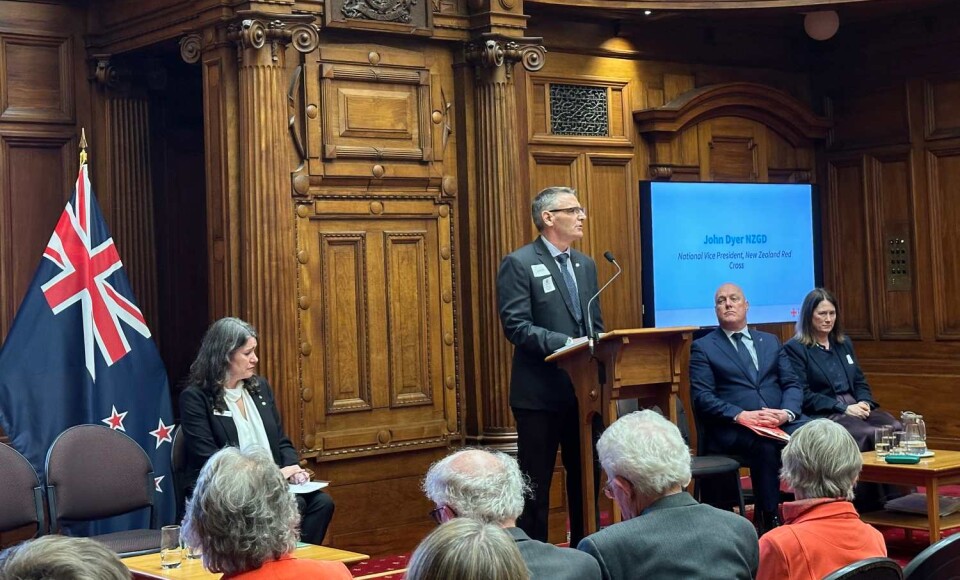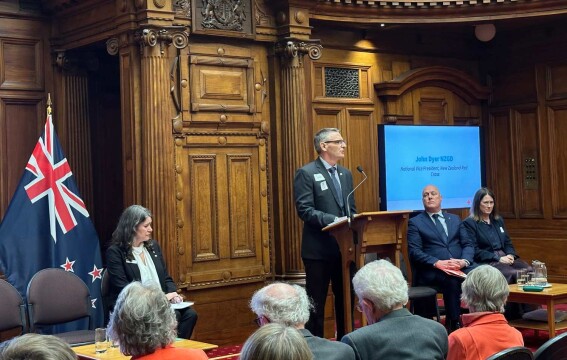What next for the Geneva Conventions? Vice-President John Dyer speaks
13 August 2024


On 7 August New Zealand Red Cross marked the 75th anniversary of the Geneva Conventions with an event at New Zealand Parliament.
We were joined by the Prime Minister, Right Honourable Christopher Luxon, Members of Parliament, diplomats, and many international humanitarian law champions.
New Zealand Red Cross Vice President John Dyer spoke about the importance of the Geneva Conventions and the way they actively protect civilians, medics, and aid workers during conflicts.
The below is his speech to those gathered, lightly edited for ease of reading.
Vice-President John Dyer's speech
Tēnā koutou, tēnā koutou, tēnā tatou katoa
I’d like to briefly cover three topics today:
- why the Geneva Conventions matter
- how the Red Cross and Red Crescent Movement (RCRC) works as a guardian of the Geneva Conventions in this space
- and, finally, the eternal question: what next?
The Geneva Conventions are one of humanity's most important accomplishments of the last century. As they turn 75, they are as relevant as ever. Why? Because wherever there is war and conflict, there is a need for agreed rules to curb the worst of humanity’s excesses.
In recent years conflicts have grown in number and complexity, with many becoming protracted into decades-long strife. The International Committee of the Red Cross (ICRC) is currently working in 100 conflict zones.
The international message from our Movement is simple: the Geneva Conventions are the rules of war. They are the one set of rules which have been universally accepted across all UN member states, and which remain the core of international humanitarian law.
The Conventions actively protect the civilians, medics, and aid workers protecting humanity in the midst of war. They also protect those who can no longer fight, such as the wounded, sick, or prisoners of war.
The Geneva Conventions have been called the ‘DNA’ of the International Red Cross Red Crescent movement. They are the legal roots of our mandate and a crucial part of our history and identity.
We were founded in 1859 by Swiss businessman Henry Dunant, in the aftermath of the Battle of Solferino. After witnessing that unconstrained warfare, he created the first Red Cross organisation to promote neutral medical assistance on the battlefield, which then led to the signing of the first Geneva Convention.
At the heart of our Movement’s fundamental principles are neutrality and impartiality. These principles are why we are trusted to provide care in conflicts. They are the reason we are called on to assist with hostage exchanges. They are why we are trusted to ensure prisoners of war are treated in accordance with our shared standards.
Red Cross remains squarely on the side of humanity and seeks to alleviate suffering wherever it is found, 160 years after our foundation.
We operate in war zones no matter which parties are involved; we operate where people are forcibly displaced; and we operate where disaster has struck.
In 2024, we are all too aware that armed conflict takes a terrible toll on combatants and civilians.
As a professional soldier for 20 years, followed by 22 years working in disaster response with the RCRC Movement, I have seen this toll. I know the importance of the Geneva Conventions and IHL in protecting those impacted by conflict.
Every four years, the ICRC hosts the International Conference where signatories can discuss and develop appropriate responses to developing global events. From there, all 191 RCRC National Societies work to disseminate key messages and develop a better understanding of the key tenets of these vital conventions.
Of course, IHL must continue to evolve to meet the new realities of warfare. Military technologies and tactics have transformed, and warfare is increasingly urbanised. Cyber operations can – and do – disrupt critical civilian infrastructure and hamper the delivery of essential services to the population.
These are areas that neither Henry Dunant nor those who drafted the first of the Geneva Conventions could have foreseen. Now is not the time to relax our vigilance on promoting, protecting and sharing information about international humanitarian law.
And so, we are pleased to be joined today by Victoria Hallum, Deputy Secretary Multilateral and Legal Affairs Group at New Zealand’s Ministry of Foreign Affairs and Trade (MFAT), who will later launch New Zealand’s first report on the domestic implementation of international humanitarian law. The report is an excellent step in disseminating locally relevant resources on IHL.
In closing, I’d like to acknowledge the mahi of successive governments on this crucial work. When the Geneva Conventions are respected – and its humanitarian spirit upheld – lives are saved and dignity is preserved, and I thank all of those here and across the motu who have, and continue to, consistently aim to do that.
Thank you very much - ngā mihi, kia koutou.
More information
Read more about the Geneva Conventions and international humanitarian law at New Zealand Red Cross.
International Humanitarian Law
Read the MFAT report on the implementation of IHL in NZ.
Report on the domestic implementation of international humanitarian law in NZ
